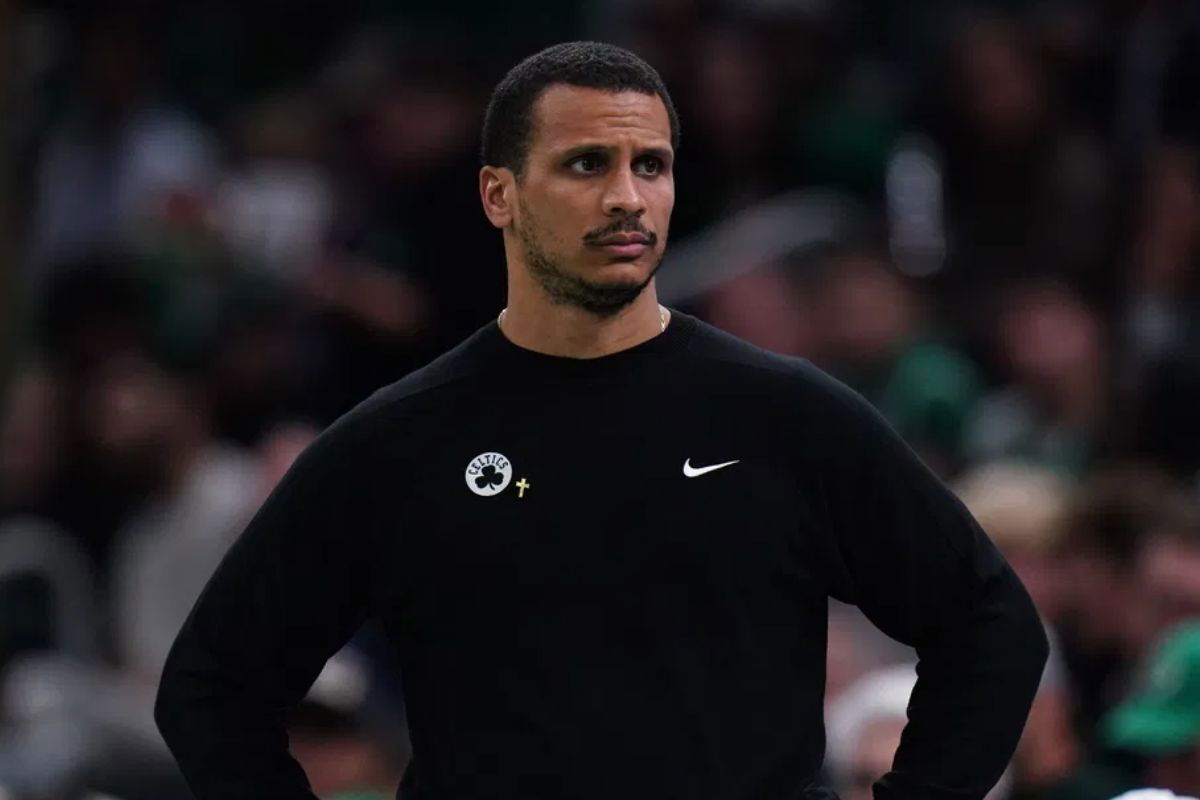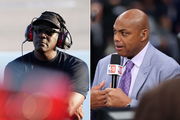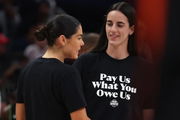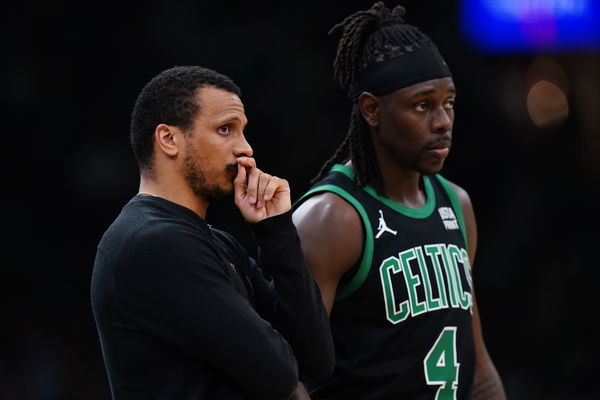
Imago
Nov 12, 2024; Boston, Massachusetts, USA; Boston Celtics head coach Joe Mazzulla watches from the sideline as they take on the Atlanta Hawks at TD Garden. Mandatory Credit: David Butler II-Imagn Images

Imago
Nov 12, 2024; Boston, Massachusetts, USA; Boston Celtics head coach Joe Mazzulla watches from the sideline as they take on the Atlanta Hawks at TD Garden. Mandatory Credit: David Butler II-Imagn Images
Game 2. Knicks 91, Celtics 90. A one-point loss that feels heavier than the box score suggests. Not because the Celtics didn’t play hard. Not because the Knicks dominated. But because, with 12 seconds left on the clock and a timeout in hand, Coach Joe Mazzulla didn’t call it.
Watch What’s Trending Now!
And yes, you read that right. He had one timeout left, he could’ve advanced the ball and drawn up a fresh look. Instead, he bet on the momentum. He let the team play through it. And now, Boston fans are left replaying those final seconds like a broken record, screaming “WHYYY” at their TVs.
When asked in the post-game presser about the decision not to call time, Joe Mazzulla didn’t dance around it. “I had one left, got a good look on the exact same play 20 seconds earlier, tried to execute the exact same thing.” That “good look” referred to Jayson Tatum’s earlier dunk—an aggressive, confident drive to the basket that cracked the Knicks’ defense wide open. So what did Joe do? He trusted that same setup again. Same players, same momentum, and same plan.
ADVERTISEMENT
Coach Mazzulla explains why he didn’t call a timeout with 12 seconds left in Game 2 pic.twitter.com/S0Ka02ohxM
— NBA TV (@NBATV) May 8, 2025
In that moment, the decision reflected a coach’s trust not just in his star player, but in rhythm over reset. There’s a school of thought in basketball that reflects: don’t let the defense get set. Keep the pressure. Keep the defense guessing. But that only works if your offense is poised, and your star is locked in.
But playoff basketball is about adapting to chaos in real-time. When the other team counters your move, you need to have a counter of your own, not just faith in the past. And well, it wasn’t the same defense. “They did a better job of their lower pickup point. We weren’t able to get the advantage that we had on that on the last Tatum dunk.”
ADVERTISEMENT
The Knicks adjusted. They crowded the ball handler. Took away space. Turned a fast-paced transition into a jammed lane. The Celtics couldn’t recreate the magic, and the opportunity slipped. Though credit where it’s due, Tom Thibodeau’s team made mid-play adjustments that shifted the outcome. Defensive positioning tightened, spacing was denied, and Tatum had fewer lanes to explore. That’s not just hustle, it’s strategic discipline.
Thibodeau, a coach known for squeezing every ounce out of his roster defensively, effectively gambled on Boston’s predictability and won. He dared the Celtics to beat them with something new. They didn’t.
ADVERTISEMENT
Did Celtics’ coach Joe Mazzulla just out-coach himself in Game 2 vs the Knicks?
Now, some might say, “Well, hey, Joe Mazzulla had a read. He stuck with it.” And yes, he tried to exploit a matchup. “They subbed out Towns, weren’t able to sub out Brunson, had action there and just didn’t execute.” That’s where it gets murky. He saw something he liked. Brunson staying in and hoping his team can capitalise on the switch. But hope doesn’t win playoff games. Execution does. And this time, the Celtics failed to convert.
The phrase “had action there” suggests a plan was in place, likely a stagger or handoff designed to free Tatum. But New York iced the screen, or at the very least, disrupted the timing just enough. That one-second delay killed the rhythm. It also highlights how thin the line is between a drawn-up play and in-the-moment chaos. Boston had the personnel, had the idea, but lacked the clarity and timing that often come from a huddle and a clipboard.
ADVERTISEMENT
Then came the ultimate follow-up. Why not use the timeout to get multiple looks? Advance the ball? Reset? Joe Mazzulla admitted the thought had merit. “Yeah, I mean, absolutely.” And there it is, the acknowledgment. The could’ve. The maybe, the moment where every Boston fan screamed into their hoodie. Because in that one possession, the Celtics didn’t get a second chance.
Top Stories
Caitlin Clark Fans Reignite Old Beef With Warrior’s Brandin Podziemski After Viral Moment

“I’m So Disappointed”: Charles Barkley Speaks Out on Michael Jordan, NBC’s Nixed Plans

Lakers Star Dalton Knecht Demands Trade- 3 Possible Destinations Feat. Milwaukee Bucks

LeBron James Takes Decision on Retirement Tour as Insider Reveals Disappointing Intel

Frustration Mounts Among WNBA Fans as League Reportedly Stalls on ‘More Realistic’ CBA Proposal.


ADVERTISEMENT
“You don’t know that at the point of JT was driving left, thought he had a good look, saw it at an angle, didn’t shoot it and ran out of time.” Ran. Out. Of. Time. This wasn’t a matter of Tatum choking. It wasn’t the Knicks outplaying the Celtics for 48 minutes. It came down to the ultimate possession. And it didn’t happen.
You can argue philosophy here. Some coaches believe in playing through the moment. Keeping defenses unsettled and avoiding over-coaching. It’s a real, respected approach. But the playoffs? The playoffs are chess, not poker. Every possession is a knife fight. And you use every tool you’ve got.
ADVERTISEMENT
After all, this was Game 2 of the Eastern Conference semifinals. In this kind of series, momentum is currency. Confidence is fragile. And Game 2 was a currency Boston chose not to cash in. And what stings more? This wasn’t a blowout. It wasn’t an off night. It was a game of inches that could’ve been gained by a whistle.
But let’s be real, Joe Mazzulla didn’t lose the game alone. The Celtics had 48 minutes to build a lead, and they didn’t. But those last 12 seconds will define this loss. Because fans don’t forget the choices that weren’t made.
It’s easy to look smart when it works. It’s brave when it doesn’t. But the truth? It’s painful. Especially when that final timeout was sitting there, unused, like a golden ticket crumpled in your pocket. So what now? Game 3 shifts the battleground. But Boston enters it bruised, not just in body, but in belief. Because the question now waits: Did their coach outsmart himself?
ADVERTISEMENT
And perhaps more importantly, will the team trust him again in the clutch? That’s the silent cost of this gamble. The psychological tax. And if this series slips away, those 12 seconds won’t just be a moment. They will be a memory that haunts an entire season.
ADVERTISEMENT
ADVERTISEMENT
ADVERTISEMENT